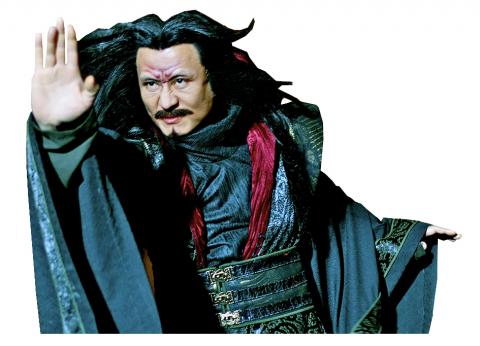This week’s gossip begins with celebrity drug trouble, and ends with one angry mother.
Veteran actors Coco Sun (孫興) and Mok Siu-chung (莫少聰) of Hong Kong made headlines after they were arrested in Beijing last month on suspicion of possessing and consuming illegal substances. On April 15, the police collared Sun for allegedly having marijuana and ketamine in his apartment. The 47-year-old actor soon admitted that he has used various kinds of drugs for the past five years to give himself “energy” as his two failed marriages have exhausted him.
Mok was arrested on the same day for marijuana use. The 50-year-old actor said he only smoked a joint that a friend gave him at a party out of politeness, adding that it was his first time. According to some media reports, the bust was a setup intended to teach the lothario a lesson.

Photo: Taipei Times
The arrests sent the Chinese showbiz world into a frenzy, according to Chinese media. It is reported that Sun, who could face life imprisonment, turned stool pigeon and named other celebrity druggies and his dealers — including a “heavyweight star” — in the hope of receiving a lighter punishment. Many stars and celebrities have reportedly fled China’s capital. For the record, Sun says he didn’t snitch.
Mok was released on Saturday after a 14-day stint in the Chaoyang District Detention Center. As for Sun, Chinese media speculate that the most credible scenario is one year in rehab.
Meanwhile, back in Taiwan, Chinese restaurateur Zhang Lan (張蘭) came face-to-face with local media still upset about how they were treated during the March 22 wedding of her son, Wang Xiaofei (汪小菲), and Barbie Hsu (徐熙媛, aka Big S). Zhang was in town over the weekend for a business meeting. Though gossip hounds have put her under a microscope, the 54-year-old businesswoman started off the trip coming across as self-assured and talked confidently.
On Friday last week, Zhang revealed her plan to open five to 10 restaurants in Taiwan in the next three years. “I will bring the best Chinese cuisine to improve Taiwanese people’s palate,” she said. And after an earthquake on Saturday, the entrepreneur was quoted as saying: “I like earthquakes. I bring earthquakes because I am full of energy.”
But the attention seemed to get too much by Sunday, when local media reported that a journalist asked why Wang only gave part of the wedding money he and Big S received to charity, after the couple had promised to donate it all. “I think you are very unkind … I am an entrepreneur, not your prey,” Zhang was quoted as screaming. “I am pissed off!”

Towering high above Taiwan’s capital city at 508 meters, Taipei 101 dominates the skyline. The earthquake-proof skyscraper of steel and glass has captured the imagination of professional rock climber Alex Honnold for more than a decade. Tomorrow morning, he will climb it in his signature free solo style — without ropes or protective equipment. And Netflix will broadcast it — live. The event’s announcement has drawn both excitement and trepidation, as well as some concerns over the ethical implications of attempting such a high-risk endeavor on live broadcast. Many have questioned Honnold’s desire to continues his free-solo climbs now that he’s a

As Taiwan’s second most populous city, Taichung looms large in the electoral map. Taiwanese political commentators describe it — along with neighboring Changhua County — as Taiwan’s “swing states” (搖擺州), which is a curious direct borrowing from American election terminology. In the early post-Martial Law era, Taichung was referred to as a “desert of democracy” because while the Democratic Progressive Party (DPP) was winning elections in the north and south, Taichung remained staunchly loyal to the Chinese Nationalist Party (KMT). That changed over time, but in both Changhua and Taichung, the DPP still suffers from a “one-term curse,” with the

Jan. 26 to Feb. 1 Nearly 90 years after it was last recorded, the Basay language was taught in a classroom for the first time in September last year. Over the following three months, students learned its sounds along with the customs and folktales of the Ketagalan people, who once spoke it across northern Taiwan. Although each Ketagalan settlement had its own language, Basay functioned as a common trade language. By the late 19th century, it had largely fallen out of daily use as speakers shifted to Hoklo (commonly known as Taiwanese), surviving only in fragments remembered by the elderly. In

Lines between cop and criminal get murky in Joe Carnahan’s The Rip, a crime thriller set across one foggy Miami night, starring Matt Damon and Ben Affleck. Damon and Affleck, of course, are so closely associated with Boston — most recently they produced the 2024 heist movie The Instigators there — that a detour to South Florida puts them, a little awkwardly, in an entirely different movie landscape. This is Miami Vice territory or Elmore Leonard Land, not Southie or The Town. In The Rip, they play Miami narcotics officers who come upon a cartel stash house that Lt. Dane Dumars (Damon)